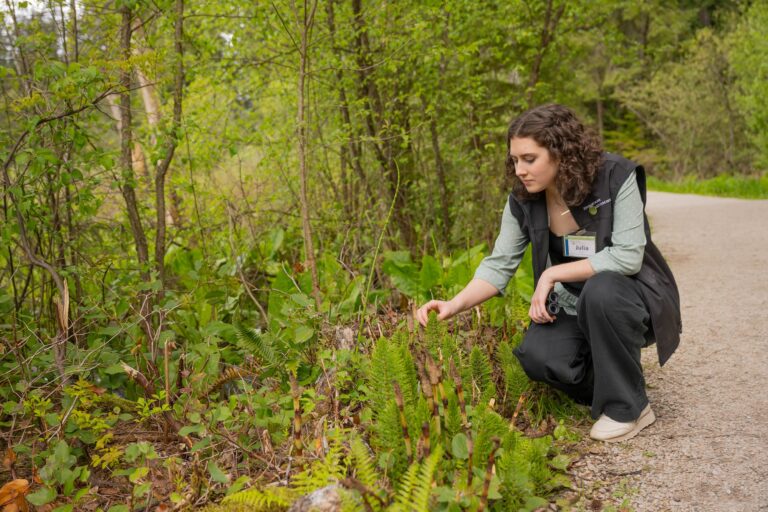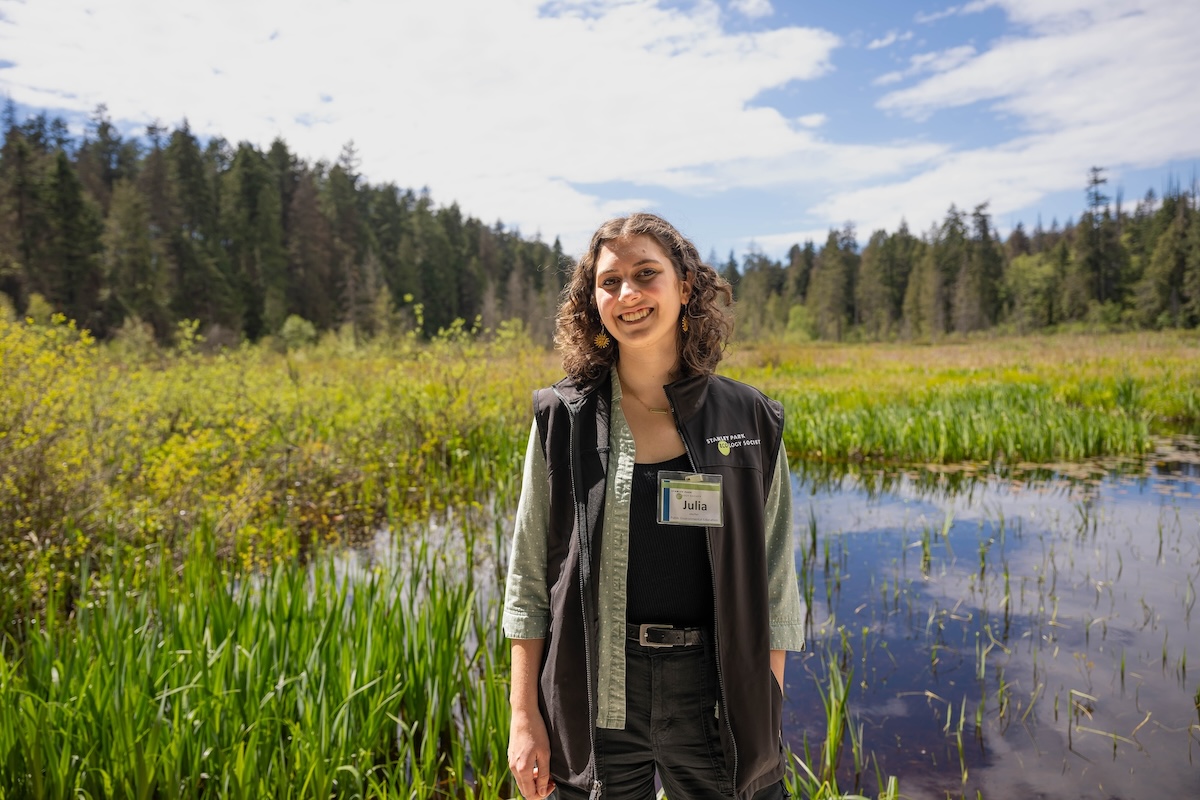Julia is an alum of UBC’s Global Resource Systems program and now works as a Public Environmental Education Coordinator at Stanley Park Ecology Society.
During her time at UBC, she got to participate in biodiversity monitoring research at the UBC Farm, contribute to UBC’s Climate-Friendly Food System framework, research the effects of bird-friendly window coverings at the Buchanan building complex, and participate in a Directed Studies at the xʷc̓ic̓əsəm Garden learning about Indigenous ways of knowing and plants as medicine.
Read on to find out Julia’s favourite spots on campus, (she’s an expert after living on campus for three years!), and what she says are the benefits a smaller, lesser-known faculty.
1. How did your experiences at UBC help you shape your future?
I was able to get involved in diverse experiences at UBC that helped me build skills relevant to many parts of my life, including my career but also personal development and community engagement. Not only did I discover things that I was passionate about, but equally helpful was getting to try out new experiences and figure out when they weren’t a good fit for me. I felt more confident knowing what I enjoyed doing and what I was good at after taking advantage of the vast array of opportunities available at UBC and using that to inform what I pursued after graduation.
2. In what ways did UBC allow you to create your own unique experiences and path?
My program, Global Resource Systems, was the perfect fit for me, as I got to apply my passion for sustainable food systems with environmental science, all while focusing on real-world action through an interdisciplinary lens. I was encouraged to take my learning outside of the classroom and apply my learning in other settings, and with so many options, it meant that I could create the exact right combination of experiences to fuel my aspirations and unearth new goals along the way.
3. How did your interests and passions help to shape your education journey?
I got to explore different aspects of “Land and Food Systems” that fascinated me but also provided a more holistic understanding of the interconnected issues in my field. I followed my interests to shape my degree by taking courses in marine ecology, political science, community forestry, Indigenous fisheries co-management, plant biology, and many others on my journey that satisfied my academic curiosity but also helped me break down the arbitrary educational boundaries that we can sometimes believe in.
4. How did UBC give you hands-on experience in your field of study?
I got the chance to see what different areas of work could look like in my field, from my time doing biodiversity monitoring research at the UBC Farm, to disseminating food systems research through my science communication role, to participating in a Directed Studies at the xʷc̓ic̓əsəm Garden learning about Indigenous ways of knowing and plants as medicine. I could work, volunteer, and have classes in spaces like a working organic farm right on campus which was incredibly valuable and opened my eyes to what I could explore after leaving university. Even in coursework in the classroom, I was able to have a hand in actual policy and change on UBC’s campus, such as contributing UBC’s Climate-Friendly Food System framework through a collaboration with the SEEDS Sustainability Program, or researching the effects of bird-friendly window coverings at the Buchanan building complex to prevent collisions.
5. You’re now working at the Stanley Park Ecology Society. What is your role there and how was the transition from being a student?
I work as the Public Environmental Education Coordinator for the Stanley Park Ecology Society, where I organize and deliver public programming about ecological topics related to what we call “Stanley Park” and our local biodiversity. I plan quarterly events on themes such as plant identification, pollinators, the great blue heron colony, beavers, wetland and forest ecology, bats, and many others, often informed by the knowledge from my UBC degree and roles I had as a student. My job includes a mixture of administration, creativity, exploring outside, and leading groups (ages 5-75+, from many backgrounds and knowledge bases) in different walks, workshops, and field trips around the park. My day-to-day is always changing and no two work days have the same flow, which has helped when transitioning from the excitement of student life, and ensures I get to experience a lot of aspects of environmental non-profit work.

6. What are your favourite spots on campus? Best study spots, places to eat, best coffee?
Having lived on campus for three out of my five years, I developed some favourite locations all around UBC, with my unconventional top spot going to the UBC Farm as beautiful place to connect to the land and visit the farm markets. Other favourites include Loafe Cafe for a delicious oat chai latte and catch-up with a friend, as well as Sprouts for cheap, student-run, community-oriented food! To study, I liked to go to the Education Library where there is a corner with houseplants along the windows and usually an available outlet. Then, if I needed a break away from screens or textbooks, Nitobe Memorial Garden was one of my favourite spots to really step out of the academic world for 15 minutes and wander the mossy paths.
7. Do you have any tips or advice for someone who’s considering UBC Vancouver?
One piece of advice I have is to try to look into the lesser-known programs, where you may discover something that you never knew was even a possibility for your university career. But you can also start out in something more general, and keep an open mind to adjusting your courses once you find the right niche focus. It may also mean you get the benefit of a smaller cohort of like-minded people in your same program or faculty that nestles into the larger community of UBC as a whole, like I had in the Global Resource Systems program in the Faculty of Land and Food Systems — a smaller, lesser-known faculty. If I had been tied down to one topic early on, I would’ve missed out on the chance to explore interconnected topics and carve my own specialization along the way.
